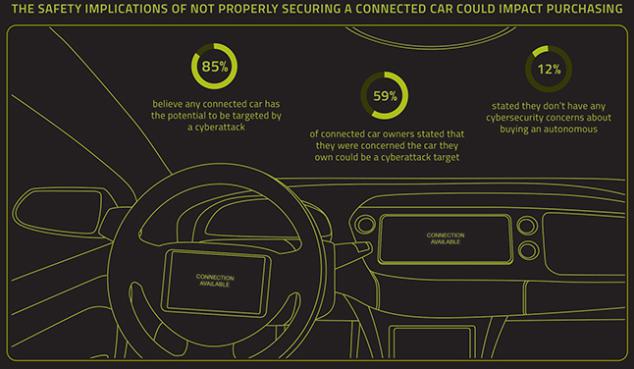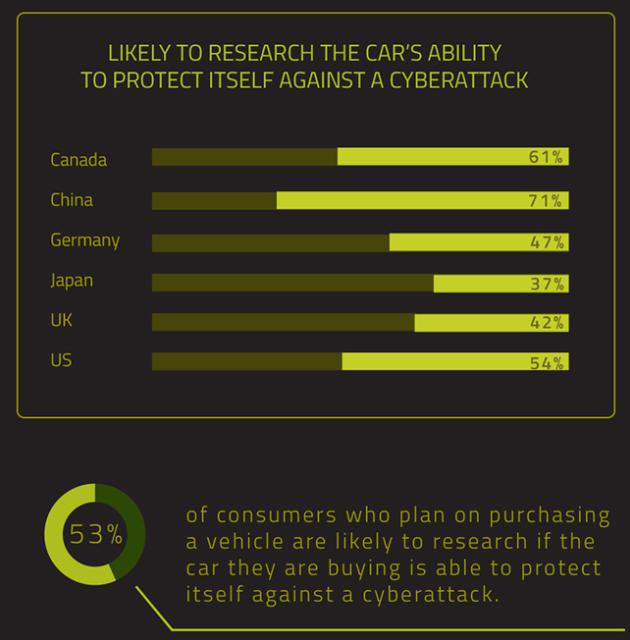
According to foreign media reports, 93% of consumers believe that they do not own or do not know whether they own an internet car, and 49% of consumers do not own or plan to own an internet car. In the Irdeto Global Connected Car Survey, 8,354 users stated that they are suspicious of the cyber security of connected cars and are concerned that they will be attacked by the Internet.
The survey focused on Canada, China, Germany, Japan, the United Kingdom, and the United States, of which 85% of consumers surveyed said that they believe that connected cars may become new targets of cyber attacks. Of these, nearly 90% of users in Canada and the United Kingdom stated that connected cars will become new targets for hackers.
Consumers said that the reason they do not own connected cars is that they do not understand the components of the connected cars and are worried about the accompanying cyber security risks and hacking attacks. This has become a major obstacle to their purchase of connected cars.
Network security has become a core consideration in the purchase of connected cars

The survey found that of the users who plan to purchase cars in the future, 53% of users may study the vehicle’s defense capabilities against cyber attacks. Among the surveyed consumers in six countries, Chinese users are most likely to engage in such research before purchasing a car. (71%), while Japanese users are least likely to do such things (37%).
When purchasing a car, mainstream users who consider network security are young people, aged 25-34, accounting for 62%. He (she) said that before the purchase of the car will study the vehicle's network security protection capabilities. For users over the age of 55, only 43% will be concerned about the vehicle's network security protection capabilities.
Daniel Thunberg, Head of the Internet at IDC, said: "Obviously, network security has become a core consideration for many users to purchase next-generation connected cars. It is important that car companies should adopt a multi-layered defense strategy as their core strategy. In order to ensure the required safety from the initial stage of the manufacturing process, car manufacturers and tier-1 supply commerce must be one step ahead of hackers, and through the adoption of proper security measures, consumers can rely on the safety of connected cars. â€
The safety of connected cars and self-driving vehicles is worrying
The survey shows that 59% of connected car owners are concerned about the cyber attacks on their vehicles. Consumers feel that connected cars are not only a new generation of vehicles but also new targets for hackers. The survey found that most users are concerned about the introduction of self-driving vehicles and are concerned about new security issues. Only 12% of respondents stated that they did not consider network security issues when purchasing autonomous vehicles.
Although consumers have not yet understood the safety of the components of connected cars or self-driving cars, they already understand that there are certain safety risks in purchasing such vehicles.
Jaco Du Plooy, Irdeto's vice president of Cloakware, said: "As the number of connected cars and self-driving cars continues to increase, so will the number of vehicles and the surrounding environment and other connected devices. This will only increase the protection of the vehicle itself. It is not enough to ensure that the entire connected ecosystem of cars is protected, including: ensuring the security of V2X communications to ensure the safety of communication between vehicles and devices, especially for autonomous vehicles. It is particularly important, including: the protection of vehicle-mounted communication equipment to ensure the future network security of vehicles." (This article is taken from helpnetsecurity.com)
Truck Brake Pad,Brake Pads,Rear Brake Pads,Truck Brake Pads
Hengshui Weihua Naioute Auto Parts Co.,Ltd , https://www.hsnotbrakepad.com
